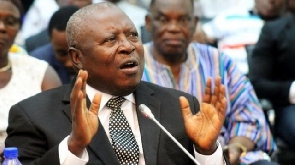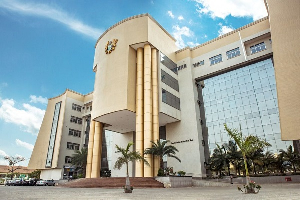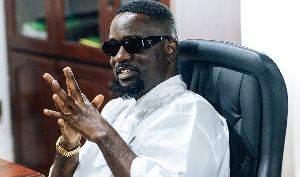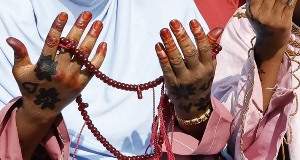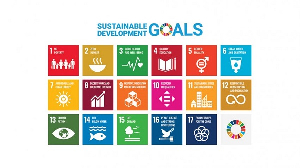The 1992 Constitution needs non-partisan constitutional activists and patriots to defend it from being imploded by the greedy and selfish machinations of the partisan political elites to assume political power to continue, or have, their turn to eat again, by engaging in dishonestly peddling disinformation and/ or misinformation to entice the suffering innocent masses into violent confrontations to undermine and subvert the constitutional regime.
The events in the Parliament of Ghana on 15, 17, 18, and 22 October 2024 were deliberately orchestrated to bring the 1992 Constitution to the brink of the precipices and dysfunctionality.
The conflict interaction moves and countermoves from the NDC and the NPP on the meaning of Article 97(g) and (h) of the 1992 Constitution invited the Supreme Court as the final arbiter of constitutional disputes to assume jurisdiction in settling the destructive or unproductive conflict interaction between the two adversarial political parties.
This is a Supreme Court which was vetted and approved as qualified and competent by the now antagonist two major political parties and appointed under the Constitution. Any of the two major caucus in Parliament that is dissatisfied with a decision or order of the Supreme Court knows the constitutional procedure to resort to for redress instead of using the electronic, print, and broadcast media to further incite the suffering masses with the intention of taking advantage of and recruiting them for the political elite’s violent intentions of subverting the peace and quiet of the nation for the sake of raw political power acquisition.
The Supreme Court has assumed jurisdiction in the matter and every citizen must respect the decisions and orders of the Court whatever one’s emotional political leanings and future political expectations might be.
I can understand the stalemate in Parliament following the decision and orders of the Supreme Court on Friday, 18 October 2024. I can also understand the need for the Speaker to save face by adjourning the sittings of Parliament sine die in the light of the fact that the decision and orders of the Court dented his ego and standing in the eyes of the public. I can further understand the majority side petitioning for Parliament to reconvene.
These are foreseeable standard textbook conflict escalatory moves and countermoves. The Speaker of Parliament must, therefore, take responsibility for the ensuing stalemate because he knew that the moment the minority moved the motion and the majority opposed it, each adversary had deployed conflicting and inconsistent meanings to Article 97(1)(g) and (h) giving rise to issues of interpretation and enforcement of the Constitution apportioned to the Supreme Court and not the mere application of the provisions to the facts of the motion. The Speaker himself said in paragraph 13 of his ruling as follows:
“13. Hon Members, it has been suggested by some members that the provisions of Article 97(1)(g) and (h), which address the vacating of a Member of Parliament’s seat due to defection, should be understood prospectively—that is, they should apply only to future Parliaments and not to the term of office of Parliament when the act occur.”
The foregoing is another example of the clearly competing interpretations on the meaning of the above provision of the Constitution which the Speaker knew he had no power to make by choosing one meaning over the other.
As a Member of the NDC in Parliament for 32 years (as the Minority Leader touting the credentials of the Speaker said), the Speaker with both eyes widely open decided in his usual style to torch the volatile ambers of passion and put the nation on fire by delivering the declarations he made on the vacation of four seats in Parliament to make his NDC side the majority in Parliament.
The context of the on-going intractable conflict on the proper interpretation of Article 97 of the Constitution begun in Tamale, however, needs to be understood for a reasoned and objective dialogue on the current volatile stalemate to succeed in bringing about a resolution in the marketplace of ideas called a democracy.
On 13 October 2024 Ghana Web reported a contribution by one of its contributors in the person of one Ahmed Hudu, that thousands of people had crowded at the Tamale North Constituency on Saturday, 12 October 2024 for the launch of the incumbent NDC Member of Parliament’s 2024 parliamentary re-election campaign which was attended and supported by other named leading Members of Parliament and Executive Members of the NDC.
The contributor’s report, which translated on 15 October 2024 into the motion to vacate four seats tabled in Parliament which in turn generated the stalemate in the conflict interaction between the NDC and the NPP in Parliament threatening the nation’s stability on whether Members of Parliament intending to contest the 2024 election as independent candidates could do so under Article 97 of the 1992 Constitution, was that:
“During the event, Haruna Iddrisu called on the NDC parliamentary caucus, the Speaker of Parliament, and all NDC members to declare the NDC as the majority group in Parliament Wednesday, October 12, (sic) in accordance with Article 97(g) of the Constitution. This declaration, he argued, was essential to assert the party's numerical advantage and secure its influence in legislative processes. His call for prompt action energised the crowd, emphasising the importance of the upcoming months leading to the general elections.”
On Monday, 14 October 2024, Ghana Web again reported with its source as starrfm.com.gh on what happened in Tamale, inter alia, as follows:
“The former minority leader and MP for Tamale South Constituency, Haruna Iddrisu, has stated that the 4th Republican Parliament will undergo a constitutional test that will result in the NDC Minority becoming the Majority in Parliament. He assured that they plan to invoke Article 97 of the Constitution during the next parliamentary session on Tuesday, which would effectively shift their status from minority to majority in Parliament.”
The declarations made and reported in Tamale in the media was a conflict interaction move signal by the former NDC Minority Leader of events to come when Parliament reconvened on Tuesday, 15 October 2024.
In the absence of trust and prior consultation between the NDC and the NPP, the latter was bound to lose face if it did not deploy an escalatory conflict interaction countermove or reaction.
Not surprisingly, therefore, and in accordance with theories of conflict studies and conflict resolution, the NPP Majority Leader of Parliament was reported on 15 October 2024
by Ghana Web to have “filed a suit at the Supreme Court invoking the court’s jurisdiction in interpreting some provisions in Article 94 of the constitution” and had “also applied for an injunction to stop the Speaker of Parliament, Alban Bagbin, from declaring some four parliamentary seats vacant.”
The declaration of the Minority’s intention to raise the issue of Article 97 (g) and (h) in Parliament had stated that: “.... the 4th Republican Parliament will undergo a constitutional
test that will result in the NDC Minority becoming the Majority in Parliament.” A constitutional test as distinct from a legislative test finally ends in the Supreme Court, as it has. One cannot create an inferno one knows can consume the whole constitutional edifice and blame others for it.
The only reasonable way to contain the selfish inferno started in Tamale and consummated by the Speaker in Parliament is to allow the Supreme Court to authoritatively decide the issues and for everybody to abide by those decisions whether they are palatable or unpalatable to the contesting camps of the two political elites.
Over the years of my advocacy in constitutional disputes in the Supreme Court as an NDC Government appointee on behalf of the Republic of Ghana I learnt a hard and bitter lesson in the mid-1990s on the powers of the Court.
At the hearing of one such constitutional case brought by Akufo-Addo, Prempeh & Co on behalf of a client against the Republic, the Supreme Court subjected the late Mr. Akoto Ampaw who appeared that day on behalf of Nana Akufo Addo, to gruelling questioning without even bothering to seek the legal views of the Republic on the matter, for which I was readying myself to submit forcefully that the fairness of the case demanded a full hearing on the merits instead of non-suiting the plaintiff on technicalities.
The Court, thereafter, wrote a ruling dismissing the action against the Republic. I, the legal idealist felt nauseated and shocked by the ruling of the Court. I crossed over to the other side to urge Mr. Ampaw to apply for a review of the ruling and assured him that I would support his application for the case to be heard on the merits.
After I left the court room I went to the office of the Judicial Secretary, the late Alhaji Dramani Yakubu, to persuade him to arrange for us to meet the Chief Justice in his chambers after the close of the Court to enable me to make a protest. After patiently listening to my complaints about the unfairness of the manner the case was summarily dismissed, the Chief Justice said something to the following effect to me in the presence of the Judicial Secretary: “Amidu, look, look, even if you are right, you should know that what the Court did and decided is the law until it is overturned by another court. What you think does not matter until then.” I was shocked and scandalized, but that is the reality whether in Ghana or in the Anglo-Saxon jurisdictions from where we borrowed our constitutional jurisprudence.
I have never been happy with the decision in that case and will never be. The Chief Justice, the Judicial Secretary, Mr. Akoto Ampaw, and Mrs. Adusa-Amankwa, one of the Chief State Attorneys who was with me in the case are all late. Mr. Thomas Ahlijah was the other Chief State Attorney with me in the case. Mr. Ampaw refused to ask for a review. The decision has not been overturned and is still the law, wrong as I think it was, and still is. The simple justification for the Chief Justices admonishment might have been the century old statement that: “This is a court of law, young man, not a court of justice.” Law is not morality!
But in the Amidu v Woyome No. 2 case, I got the Supreme Court to unanimously overrule itself in a case it had unanimously decided against my Writ and Statement of Case in favour of Woyome by a bench of nine on an application for review to a bench of eleven including eight members of the previous Court. The statement may after all be true that: “The life of the law has not been logic: it has been experience.” Court House Governance is a different ball game the entire world over.
A Speaker of Parliament who loads his office with his political party colleagues as public office employees holding party political offices concurrently cannot lay more claim to impartiality than a Supreme Court properly approved by a bi-partisan Parliament and appointed under the Constitution to exercise judicial power. The Speaker of Parliament, therefore, needs to think long before side stepping the orders of the Supreme Court through subterfuges to preside over pushing the 1992 Constitution into the inferno of implosion instead of defending it as his oath of office and the Constitution demands. I am making my voice heard because I did not spend my youthful years participating in the birth of the 1992 Constitution and the founding of NDC in 1992 for the Constitution to be brought to the precipices of implosion by needless electoral opportunism and adventurism.
The legislative and executive branches of government need no reminder that in third world countries, when the constitutional order implodes because of the greed and avarice of the political elite, the judicial branch is the only branch which always survives, at least in the interim and in most cases the long term. The stability and survival of the Fourth Republic of Ghana as a whole must take precedence over transactional politics, opportunism, and adventurism by groups of political elites bent on serving parochial and short term self interests instead of the interest of the citizens of Ghana.
Opinions of Friday, 25 October 2024
Columnist: Martin A. B. K. Amidu

